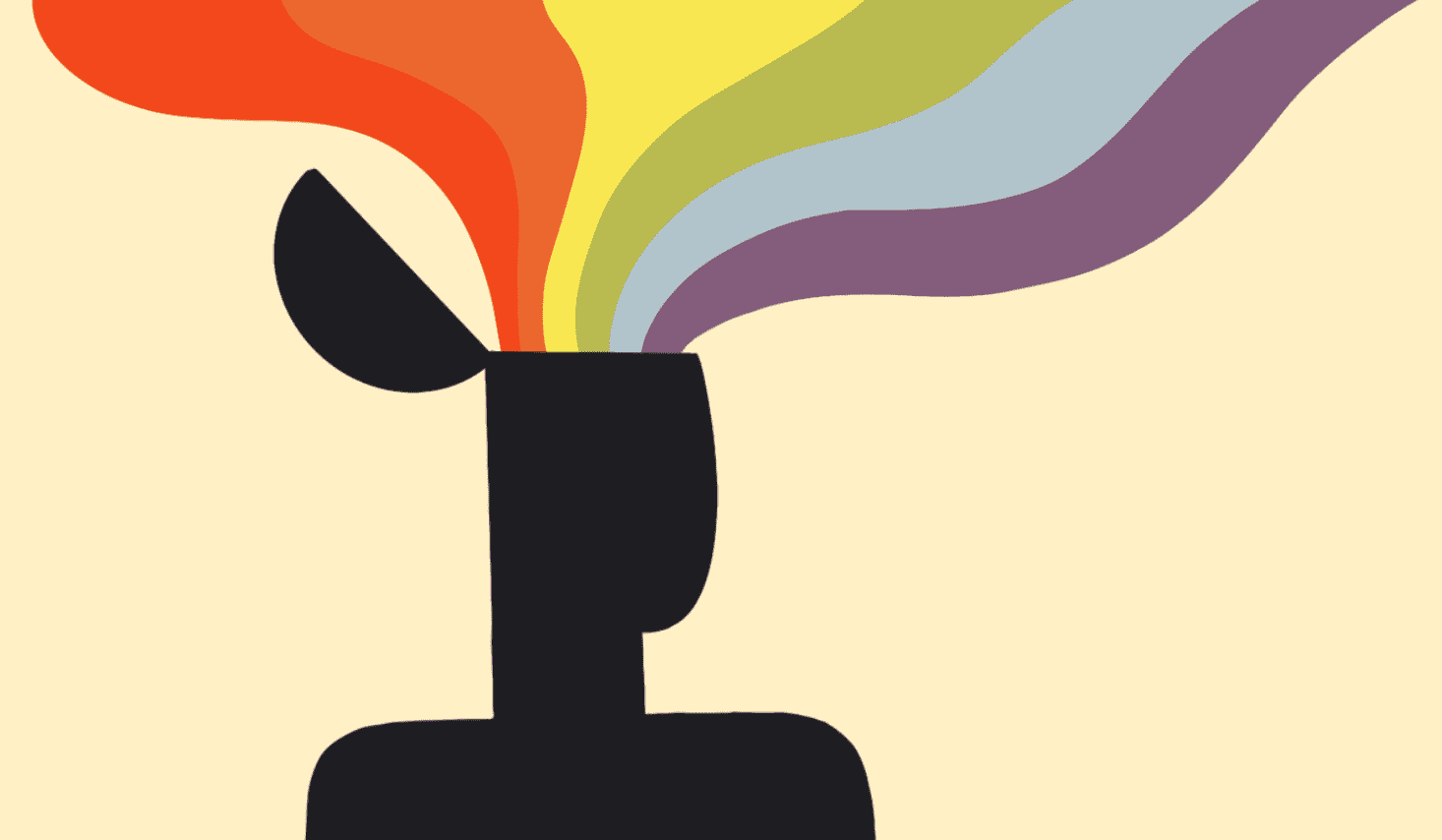
Mental health can seem like a daunting subject, especially for the LGBTQ+ community. We spoke to LGBTQ+ people to get an insight into how mental health impacts the community and how we can constructively tackle the taboos of the subject.
At first glance, data concerning the LGBTQ+ community can seem to paint a bleak picture of how queer people are disproportionately more likely to be impacted by mental health issues. Crisis counsellor Alexis Caught agrees that the current mental health crisis has worsened, but hopes open discussions around the topic will lead to greater transparency on mental health. “The reality is that things are tough. Mental health rates are worsening across all populations, it’s no wonder that they’re getting worse for those of us who are less protected and so are more at risk of feeling the rising tensions in society,” he says. Through candid conversation, Caught believes members of the LGBTQ+ community will feel empowered and supported by their co-community: “We have to speak up about how we’re truly feeling, so that more LGBTQ+ people know it’s okay, and that they’re not alone. There is healing in honesty.”
The focus on mental health is vastly important, however, it’s crucial we acknowledge the unique factors that impact the LGBTQ+ community and, therefore, increase the chances of minorities encountering mental health issues. The queer community are at greater risk of experiencing a hate crime compared to non-LGBTQ+ people. Rates of depression are higher among LGBTQ+ people who’ve experienced a hate crime based on their sexual orientation and/or gender identity. Likewise, data from Stonewall revealed that nearly half of all LGBTQ+ pupils experienced bullying for their sexual orientation. River Solace, a non-binary trans wellbeing and community support worker, has vocally challenged the stigmas surrounding mental health. “There is a huge misconception that vulnerability is a weakness, but it can be your greatest strength,” they tell GAY TIMES. When it comes to looking after their mental health, Solace writes down their feelings to help process them. “Whatever way you can convey your struggles, it is incredibly brave and you will soon realise how you are very much not alone,” they explain.
Eva Echo is an activist and trans spokesperson for Gendered Intelligence. For them, discussing mental health is vastly important, especially when it comes to the LGBTQ+ community. “All communities are nuanced and have their own specific needs. The LGBTQ+ and QPOC communities are no different,” they explain. As we hope to address the needs of the LGBTQ+ community and the mental health crisis, Echo argues we need a system suitably adjusted to the requirements of queer people: “Any service must understand the specific experiences a person faces in order to be effective, to serve them and safeguard them.”
We have to meet one another with empathy, and give one another grace – space to make mistakes and learn, space to be heard and seen, space to be vulnerable
Caught, author of Queer Up: An Uplifting Guide to LGBTQ+ Love, Life and Mental Health, shares a similar sentiment to Solace and Echo, who urge for destigmatised discourse on mental health. “We have to meet one another with empathy, and give one another grace – space to make mistakes and learn, space to be heard and seen, space to be vulnerable,” he says. “Through connection, we can all begin to heal. But remember, that empathy begins at home.”
Stonewall’s LGBT in Britain report found that 44% of the LGBTQ+ people surveyed reported suicidal thoughts, compared to 26% of heterosexual non-trans respondents in 2018. The LGBTQ+ charity has called for NHS mental health services to train all staff on the needs of LGBTQ+ people (including providing training for CAMHS practitioners on referral pathways for Gender Identity Development Services).
LGBTQ+ people, of all ages, may encounter mental health issues, substance abuse or physical and emotional harm. Therefore, as we encourage members of the LGBTQ+ community to open up about their mental health, it’s necessary for those coming forward to have the appropriate care in place to support them. The systematic shortcomings of our mental health services need urgent attention, as do the harmful stigmas surrounding mental health.
Public figure and health coach Dr Sunni Patel believes it is “vital” to speak out about mental health in the LGBTQ+ community. By doing so, only then can we, as a community, put pressure on our leaders to provide “the best investment, care and resources to support our community” for gay, lesbian, bisexual, and transgender+ communities. Mental health activist Coco has dedicated their platform to creating safe spaces for Black LGBTQ+ people to feel visible and heard. As a non-binary person, they understand how trauma can shape one’s mental health. “Stigmas and stereotypes are attached to who we are and how we identify,” they tell GAY TIMES. “It’s imperative that we put the effort into our minds, hearts and community, ensuring our mental health is number one.”
Crisis counsellor Caught echoes Coco’s notion of putting mental health first and debunking stigmas. “We know, categorically, that nothing in the genetics of LGBTQ+ people causes increased prevalence of mental health issues – which leads to the question: why do LGBTQ+ people experience higher rates of mental ill health?”
The author, instead, suggests there is a pressing need for LGBTQ+ specific resources and services to support the community. “It is not queer people that are the problem, it is patriarchal, sexist, racist, transphobic and homophobic laws, societies, cultures, histories, experiences which create these increased experiences of things like anxiety, depression, suicidal ideation,” he tells GAY TIMES. “Mental health services HAVE to be LGBTQ+ informed, or we simply don’t get to the root of the problem. If we understand what’s causing that, we can begin therapeutic work to address the underlying issues, and with it, improve mood, balance and wellbeing.”
Yassine Senghor is an Equalities, Diversity & Inclusion specialist with a specific focus on LGBTQ+ people. As a part of the community, she empathises with the barriers many of us face. “It can sometimes feel like the odds are stacked against us,” she says. “While things are improving, there is still so much stigma around mental health. Being able to speak openly about our experiences, including when we are struggling allows us to remove notions of shame and guilt around mental health. It is a way of taking back ownership of our lives and finding strength in the community.”
Our voices hold so much power when we speak up about our share lived experiences. We begin to normalise mental health
Fitness coach and actor Taofique Folarin found security in his vocalisation of mental health struggles. “Our voices hold so much power when we speak up about our share lived experiences,” he says. “We begin to normalise mental health, we can stomp the stigma that surrounds it and instigate positive change. Small actions make all the difference.” By making a step to move forward and share his story, Folarin found that he was able to make others feel seen in the way he was. “By speaking up to my peers and community, I no longer felt so isolated. This first action of reaching out was the catalyst for me to take control of my health, which resulted in me being of service to others who were struggling too.”
As we push for regular, open conversation about mental health, writer Caught reminds us that conversations alone are not a remedy and we must seek professional help where it is required. But, when contributing to discussions about mental health, the Queer Up author reiterates the importance of “good practice” when approaching these topics. “Good mental health is feeling the full spectrum of human emotions,” he explains. Caught encourages people experiencing mental health issues (anxiety, depression) to “[look] at the story we tell ourselves” as “these stories hold real power and influence our moods” alongside taking the appropriate medical support if it is necessary.
GAY TIMES is a strong believer in spotlighting mental health in the LGBTQ+ community. However, we also understand that not everyone has the same access and resources available. We have pulled together a list of services for those who may be dealing with mental issues.
Please contact the below groups if you need support and guidance with your mental health: Happy Valley Pride is a local Pride group, Switchboard offers a free specialist LGBTQ+ helpline, Antidote is the UK’s oldest LGBTQ+ drug and alcohol service, Mermaids provides support to young trans and gender diverse people and their families, charities Gendered Intelligence and Not A Phase provide support to trans adults across the UK, and also MindlineTrans+ is a free helpline run by, and for, trans, non-binary and gender diverse people.



